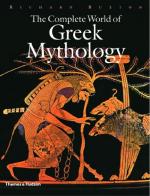|
This section contains 8,092 words (approx. 27 pages at 300 words per page) |

|
SOURCE: Imaginary Greece: The Contexts of Mythology, Cambridge University Press, 1994, 250 p.
In the following essay, Buxton examines the characteristics of Greek divinity and discusses such prevailing themes of the divine myths as violence, deception, negotiation, power, and honor.
Relating the landscape and the family of the Greek imaginaire to the world behind and beyond them involves … considerable methodological complexities. When we focus on narratives about gods, matters become more problematic still, since the world which the stories transform may be seen as either (1) the whole fabric of social life, or (2) the practices of ritual, or (3) 'ordinary' beliefs about divinities. Later I shall have a little to say about (2)—a subject which has exercised a perhaps excessive dominance over recent scholarship—and rather more to say about (3), which has, by comparison, been neglected. But I begin by recalling some general features of the Greeks' narratives about gods, in order...
|
This section contains 8,092 words (approx. 27 pages at 300 words per page) |

|


